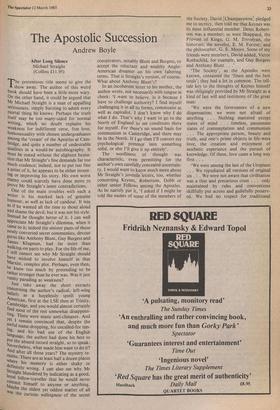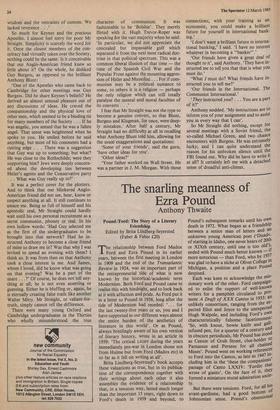The Apostolic Succession
Andrew Boyle
After Long Silence Michael Straight (Collins £11.95)
The pretentious title seems to give the show away. The author of this weird book should have been a little more wary. On the other hand, it could be argued that Mr Michael Straight is a man of appalling seriousness, simply bursting to admit every mortal thing he knows. Perhaps the truth Itself may be too many-sided for normal writing, which no doubt explains his weakness for indifferent verse, free love, homosexuality with chosen undergraduates among the 'cream' of the Apostles at Cam- bridge, and quite a number of undesirable qualities in a would-be autobiography. It must be stated without the slightest hesita- tion that Mr Straight's line demands far too Much credence; indeed, not to put too fine a Point of it, he appears to be either invent- ing or improving his story. His own worst enemy could scarcely have done more to prove Mr Straight's inner contradictions.
One of the main troubles with such a writer is his marked lack of genuine humour, as well as lack of candour. It was as if he wanted all the time to shout aloud and shame the devil; but it was not his style. Instead he thought better of it. I can well appreciate Mr Straight's dilemma, when it came to it; indeed the sinister pasts of those newly converted secret communists, devout gurus like Anthony Blunt, Guy Burgess and James Kingman, had far more than walking-on parts to play. For the life of me, I still cannot see why Mr Straight should have wished to involve himself in that Marxist, complex plot. Perhaps, even then, he knew too much by pretending to be rather stronger than he ever was. Was it just vanity parading as weakness? Just take away the short extracts concerning the author's radical, left-wing beliefs as a hopelessly spoilt young American, first at the LSE then at Trinity, Cambridge, and you would almost certainly find most of the rest somewhat disappoin- ting. There were many anti-climaxes. And Yet I remain convinced that, despite the awful name-dropping, his uncalled-for tim- ;rig, and his bad use of the English language, the author had done his best to Put the absurd record straight, so to speak. Nevertheless, what made him want to do it? And after all those years? The mystery re- alm-is. There are at least half a dozen places where his memory is either shaky or definitely itely wrong. I can also see why Mr Straight blundered by indicating as a good, I°Yal fellow-traveller that he would never (21/1mit himself to anyone or anything. Maybe the oldest yet oddest matter of all was the curious willingness of the secret
conspirators, notably Blunt and Burgess, to accept the reluctant and wealthy Anglo- American dreamer on his own faltering terms. That is Straight's version, of course. What about Anthony Blunt's?
In an incoherent letter to his mother, the author wrote, not necessarily with tongue in cheek: 'I want to believe. Is it because I have to challenge authority? I find myself challenging it in all its forms, communist as well as capitalist. I don't know why I do what 1 do. That's why I want to go to the North of England to see conditions there for myself. For there's no sound basis for communism in Cambridge, and there may be in the North. If I go then I'll convert my psychological pretence into something solid, or else I'll give it up entirely'.
The woolliness of thought was characteristic, even permitting for the author's own carefully concealed uncertain- ty. I would want to know much more about Mr Straight's juvenile letters, too, whether concerning Keynes, Robertson, Dobb or other senior Fellows among the Apostles. As he naively put it, 'I asked if I might be told the names of some of the members of the Society. David [Champerowne] pledged me to secrecy, then told me that Keynes was its most influential member. Denis Robert- son was a member; so were Shappard, the Provost of Kings; G. M. Trevelyan, the historian; the novelist, E. M. Forster; and the philosopher, G. E. Moore. Some of my friends were members, David added, Victor Rothschild, for example, and Guy Burgess and Anthony Blunt . .
`The Society', as the Apostles were known, contained the 'finest and the best souls'; they had a lot in common. The tell- tale key to the thoughts of Keynes himself was obligingly provided by Mr Straight as a kind of last will and testimony of the great man: 'We were the forerunners of a new dispensation; we were not afraid of anything . . Nothing mattered except states of mind . . . timeless, passionate states of contemplation and communism . . . The appropriate person, beauty and truth, and one's prime objects in life were love, the creation and enjoyment of aesthetic experience and the pursuit of knowledge. Of these, love came a long way first . . .
'We were among the last of the Utopians . . . We repudiated all versions of original sin . . . We were not aware that civilisation was a thin and precarious crust . . . only maintained by rules and conventions skillfully put across and guilefully preserv- ed. We had no respect for traditional wisdom and the restraints of custom. We lacked reverence . .
So much for Keynes and the precious Apostles. I almost feel sorry for poor Mr Straight. Simplicity is scarcely the word for it. Once the closest members of the con- spiracy had virtually taken over the Society, nothing could be the same. Is it conceivable that our Anglo-American friend knew so little about it? On the whole, he disliked Guy Burgess, as opposed to the brilliant Anthony Blunt: `One of the Apostles who came back to Cambridge for other meetings was Guy Burgess. Did he share Keynes's beliefs? He derived an almost sensual pleasure out of any discussions of ideas. He craved the companionship and the physical love of other men, which seemed to be a binding tie for many members of the Society . . . If he was angelic, you sensed that he was a fallen angel. That sense was heightened when he spoke to you. He smiled before he said anything, but most of his comments had a cutting edge . . . There was a suggestion that Guy was up to something; but what? He was close to the Rothschilds; were they supporting him? Jews were deeply concern- ed about the developing ties between Hitler's agents and the Conservative party . . . What was Guy really up to?'
It was a perfect cover for the plotters. And to think that our blinkered Anglo- American friend did not see, hear, know or suspect anything at all. It still continues to amaze me. Being so full of himself and his apostolic zeal, Mr Straight could hardly wait until his own personal recruitment as a secret communist, phoney or real. In his own hollow words: 'Had Guy selected me as the first of the undergraduates to be brought into that network? Had he in- structed Anthony to become a close friend of mine to draw me in? Was that why I was invited to spend an evening with them? I think so. It was from then on that Anthony took a close interest in me. And James, whom I loved, did he know what was going on that evening? Was he a part of the snare . . .?' Of course, he does not tell any- thing at all; he is not even asserting or guessing. Either he is bluffing or, again, he is eternally creating false trails like another Walter Mitty. Mr Straight, or valiant-for- truth, simply cannot tell the difference.
There were many young Oxford and Cambridge undergraduates in the Thirties who wholly misunderstood the true character of communism. It was fashionable to be 'Bolshie'. They merely flirted with it. Hugh Trevor-Roper was speaking for the vast majority when he said: 'In particular, we did not appreciate the concealed but impassable gulf which separated it from the next most radical doc- trine in that political spectrum. This was a common liberal illusion of that time — the time of the Spanish Civil War and the Popular Front against the mounting aggres- sion of Hitler and Mussolini . . . For if com- munism may be a political nuisance to some, to others it is a religion — perhaps the only religion which can still totally paralyse the mental and moral faculties of its converts . .
I fear that Mr Straight was not the type to become a genuine convert, so that Blunt, Burgess and Klugman, for once, were deep- ly mistaken. After half a century, Mr Straight had no difficulty at all in recalling what Anthony Blunt told him, allowing for the usual exaggerations and quotations: `Some of your friends', said the guru, `have other ideas for you'.
`Other ideas?'
'Your father worked on Wall Street. He was a partner in J. M. Morgan. With those connections, with your training as an economist, you could make a brilliant future for yourself in international bank- ing.'
'I don't want a brilliant future in interna- tional banking,' I said. 'I have no interest Whatever in becoming a "banker".'
`Our friends have given a great deal of thought to it', said Anthony. 'They have in- structed me to tell you that that is what you must do.'
`What I must do? What friends have in- structed 'you to tell me?'
`Our friends in the International. The Communist International.'
`They instructed you? . . . You are a part of it?'
Anthony nodded. 'My instructions are to inform you of your assignment and to assist you in every way that I can'.
So Mr Straight did nothing, except for several meetings with a Soviet friend, the so-called Michael Green, and two chance encounters with Burgess. He was extremely lucky; and I can quite understand the reason for his unbroken silence until the FBI found out. Why did he have to write it at all? It certainly left me with a detached sense of dreadful anti-climax.











































 Previous page
Previous page